|
|
|
Sort Order |
|
|
|
Items / Page
|
|
|
|
|
|
|
| Srl | Item |
| 1 |
ID:
164835
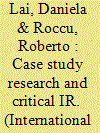

|
|
|
|
|
| Summary/Abstract |
Discussions on case study methodology in International Relations (IR) have historically been dominated by positivist and neopositivist approaches. However, these are problematic for critical IR research, pointing to the need for a non-positivist case study methodology. To address this issue, this article introduces and adapts the extended case methodology as a critical, reflexivist approach to case study research, whereby the case is constructed through a dynamic interaction with theory, rather than selected, and knowledge is produced through extensions rather than generalisation. Insofar as it seeks to study the world in complex and non-linear terms, take context and positionality seriously, and generate explicitly political and emancipatory knowledge, the extended case methodology is consistent with the ontological and epistemological commitments of several critical IR approaches. Its potential is illustrated in the final part of the article with reference to researching the socioeconomic dimension of transitional justice in Bosnia and Herzegovina.
|
|
|
|
|
|
|
|
|
|
|
|
|
|
|
|
| 2 |
ID:
164832
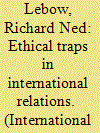

|
|
|
|
|
| Summary/Abstract |
We elaborate a little noticed strategy generally used by weaker actors both in domestic and international politics: the ethical trap. Actors who fall into such traps lose ethical standing and influence at home as well as abroad. We explore the concept of the trap and distinguish it from policy interventions and escalation in which there is no deliberate enticement. We document historical instances of successful ethical trapping both within states and between them. We also discuss traps that were not sprung. We contend that ethical traps have become an increasingly salient feature of contemporary asymmetrical warfare both within states and internationally. We conclude with some propositions about the global practice in which ethical traps are set and the conditions in which they are likely to succeed and some observations about the relative vulnerability of liberal and non-liberal regimes to these traps. This in turn says something important about the practical consequences of ethical violations in international affairs.
|
|
|
|
|
|
|
|
|
|
|
|
|
|
|
|
| 3 |
ID:
164836
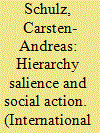

|
|
|
|
|
| Summary/Abstract |
Hierarchy is a persistent feature of international politics. Existing accounts recognize that there are many ways in which actors can stand in relation to one another. Yet they struggle to make sense of this complexity. This study considers Max Weber’s contribution to understanding international hierarchy. It discusses three ideal types of stratification based on the distribution of capabilities (class), estimations of honor and prestige (status), and command relationships (authority). Following the neo-Weberian approach, these dimensions matter because they make social action intelligible. Furthermore, Weber clarifies how class and status are connected and how these two dimensions relate to authority through the process of ‘social closure’. The study concludes that scholars who focus exclusively on authority structures miss the fact that authority typically derives from other forms of stratification: although based on different logics of social stratification, class and status hierarchies often coalesce into (legitimate) authority.
|
|
|
|
|
|
|
|
|
|
|
|
|
|
|
|
| 4 |
ID:
164837
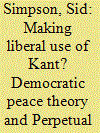

|
|
|
|
|
| Summary/Abstract |
The work of Immanuel Kant has been foundational in modern democratic peace theory. His essay Toward Perpetual Peace gives three prescriptions for attaining peace between democracies: republican institutions, a pacific union between states, and an ethos of universal hospitality. Contemporary democratic peace theory, however, has warped the Kantian framework from which it draws inspiration: the third prescription has been gradually substituted for commerce and trade. I argue that this change in emphasis produces tensions between Perpetual Peace and the body of democratic peace theory literature it spawned. Moreover, I contend that a look back at Kant’s essay sheds light on why this transformation occurred. Finally, I use this new look back at Perpetual Peace to reformulate the relationship between peace, democracy, and commerce so as to offer a new perspective on the democratic peace theory/capitalist peace theory debate.
|
|
|
|
|
|
|
|
|
|
|
|
|
|
|
|
| 5 |
ID:
164834


|
|
|
|
|
| Summary/Abstract |
This article attempts to advance the neoclassical realist framework by elaborating on the interaction between system-level and unit-level factors in the formation of states’ behavior. With an empirical focus on post-Cold War China–Russia relations, which represent the ambivalent combination of a consistently growing strategic entente and a simultaneous reluctance to form a full-fledged political-military alliance, this study establishes two major unit-level factors – differing economic models and negative historical memories – that create hurdles for alliance formation between the two countries. However, under greater systemic pressure from the US-led unipolarity, China’s and Russia’s state leaders have not only increased bilateral military-to-military cooperation but have begun to actively implement policies to deliberately transform, if not remove, the existing non-systemic hurdles. Therefore, the neoclassical realist framework can be understood and further tested as a dynamic interaction model in which the unit-level circumstances, while moderating the causal impact of the system, are themselves being transformed by the system via state policies, as is their impact on states’ foreign policy.
|
|
|
|
|
|
|
|
|
|
|
|
|
|
|
|
| 6 |
ID:
164833
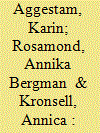

|
|
|
|
|
| Summary/Abstract |
A growing number of states including Canada, Norway and Sweden have adopted gender and feminist-informed approaches to their foreign and security policies. The overarching aim of this article is to advance a theoretical framework that can enable a thoroughgoing study of these developments. Through a feminist lens, we theorise feminist foreign policy arguing that it is, to all intents and purposes, ethical and argue that existing studies of ethical foreign policy and international conduct are by and large gender-blind. We draw upon feminist International Relations (IR) theory and the ethics of care to theorise feminist foreign policy and to advance an ethical framework that builds on a relational ontology, which embraces the stories and lived experiences of women and other marginalised groups at the receiving end of foreign policy conduct. By way of conclusion, the article highlights the novel features of the emergent framework and investigates in what ways it might be useful for future analyses of feminist foreign policy. Moreover, we discuss its potential to generate new forms of theoretical insight, empirical knowledge and policy relevance for the refinement of feminist foreign policy practice.
|
|
|
|
|
|
|
|
|
|
|
|
|
|
|
|
|
|
|
|
|